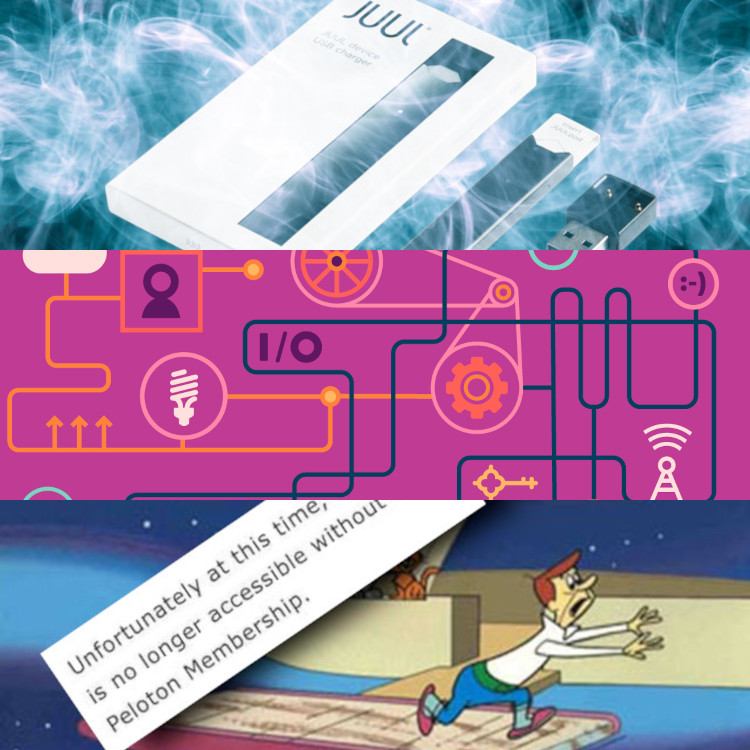
Today's Twitter threads (a thread).
Inside: The pandemic showed remote proctoring to be worse than useless; and more!
Archived at: pluralistic.net/2021/06/24/pro…
#Pluralistic
1/
Inside: The pandemic showed remote proctoring to be worse than useless; and more!
Archived at: pluralistic.net/2021/06/24/pro…
#Pluralistic
1/

This Saturday, I'm appearing on a panel at the #LocusAwards for @locusmag. @WTalabi, @UnlikelyWorlds, @karenthology and I will discourse on "Future Tech: Working the Science into Your Fiction" at 13h Pacific.
locusmag.com/2021-locus-awa…
2/
locusmag.com/2021-locus-awa…
2/
The pandemic showed remote proctoring to be worse than useless: Kill it with fire.
3/
https://twitter.com/doctorow/status/1408036621937647631
3/

#20yrsago Queer kid vs high-school censorware web.archive.org/web/2001080311…
#20yrsago AI has arrived! web.archive.org/web/2001062511…
#15yrsago Disney: We [will|won’t] sue if you put Pooh on a baby’s headstone web.archive.org/web/2006071119…
4/
#20yrsago AI has arrived! web.archive.org/web/2001062511…
#15yrsago Disney: We [will|won’t] sue if you put Pooh on a baby’s headstone web.archive.org/web/2006071119…
4/

#10yrsago Mexican Congress votes to reject ACTA techdirt.com/articles/20110…
#5yrsago The morning after the Brexit vote, Nigel Farage admits money for the NHS was a lie
5/
#5yrsago The morning after the Brexit vote, Nigel Farage admits money for the NHS was a lie
https://twitter.com/GMB/status/746218028195426305
5/

#5yrsago How to protect the future web from its founders’ own frailty memex.craphound.com/2016/06/24/how…
#5yrsago More than 30 people burned during Tony Robbins “motivational” firewalk web.archive.org/web/2016062705…
#5yrsago Sanders will vote Hillary nbcnews.com/politics/2016-…
6/
#5yrsago More than 30 people burned during Tony Robbins “motivational” firewalk web.archive.org/web/2016062705…
#5yrsago Sanders will vote Hillary nbcnews.com/politics/2016-…
6/

#5yrsago Google’s version of the W3C’s video DRM has been cracked memex.craphound.com/2016/06/24/goo…
#5yrsago Undercover reporter spent four months as a prison guard in a Louisiana pen run by CCA motherjones.com/politics/2016/…
#1yrago You are wrong about CDA 230 pluralistic.net/2020/06/24/rus…
7/
#5yrsago Undercover reporter spent four months as a prison guard in a Louisiana pen run by CCA motherjones.com/politics/2016/…
#1yrago You are wrong about CDA 230 pluralistic.net/2020/06/24/rus…
7/

#1yrago Vegas casino workers beg for their lives pluralistic.net/2020/06/24/rus…
#1yrago AOC wins pluralistic.net/2020/06/24/rus…
#1yrago EU v FB (vg!) pluralistic.net/2020/06/24/rus…
8/
#1yrago AOC wins pluralistic.net/2020/06/24/rus…
#1yrago EU v FB (vg!) pluralistic.net/2020/06/24/rus…
8/

Tuesday's threads: Improving the ACCESS Act; Juul's junk science; Peloton bricks its treadmills; and more!
9/
https://twitter.com/doctorow/status/1407381645334777859
9/

My latest novel is Attack Surface, a sequel to my bestselling Little Brother books. @washingtonpost called it "a political cyberthriller, vigorous, bold and savvy about the limits of revolution and resistance."
Get signed books from @darkdel: darkdel.com/store/p1840/Av…
10/
Get signed books from @darkdel: darkdel.com/store/p1840/Av…
10/
My book "How to Destroy Surveillance Capitalism" is a critique of Big Tech connecting conspiratorial thinking to the rise of tech monopolies (proposing a way to deal with both) is now out in paperback:
onezero.medium.com/how-to-destroy…
Signed copies here:
darkdel.com/store/p2024/Av…
11/
onezero.medium.com/how-to-destroy…
Signed copies here:
darkdel.com/store/p2024/Av…
11/

My ebooks and audiobooks (from @torbooks, @HoZ_Books, @mcsweeneys, and others) are for sale all over the net, but I sell 'em too, and when you buy 'em from me, I earn twice as much and you get books with no DRM and no license "agreements."
craphound.com/shop/
12/
craphound.com/shop/
12/

Upcoming appearances:
* Future Tech: Working the Science into Your Fiction (Locus Awards), Jun 26, locusmag.com/2021-locus-awa…
* Launch for @UnshavedMouse's When the Sparrow Falls (@MystGalaxyBooks) mystgalaxy.com/sharpson71021
13/
* Future Tech: Working the Science into Your Fiction (Locus Awards), Jun 26, locusmag.com/2021-locus-awa…
* Launch for @UnshavedMouse's When the Sparrow Falls (@MystGalaxyBooks) mystgalaxy.com/sharpson71021
13/

Recent appearances:
* Big Tech Fix, Feet to the Fire podcast:
feet2fire.net/e/a-bigtech-re…
* The ACCESS Act, @ConsumerReports:
consumerreports.org/digital-rights…
* Raging Chicken @rcpress podcast:
rcpress.podbean.com/e/out-dcoup-li…
14/
* Big Tech Fix, Feet to the Fire podcast:
feet2fire.net/e/a-bigtech-re…
* The ACCESS Act, @ConsumerReports:
consumerreports.org/digital-rights…
* Raging Chicken @rcpress podcast:
rcpress.podbean.com/e/out-dcoup-li…
14/

My first picture book is out! It's called Poesy the Monster Slayer and it's an epic tale of bedtime-refusal, toy-hacking and monster-hunting, illustrated by Matt Rockefeller. It's the monster book I dreamt of reading to my own daughter.
pluralistic.net/2020/07/14/poe…
15/
pluralistic.net/2020/07/14/poe…
15/

You can also follow these posts as a daily blog at pluralistic.net: no ads, trackers, or data-collection!
Here's today's edition: pluralistic.net/2021/06/24/pro…
16/
Here's today's edition: pluralistic.net/2021/06/24/pro…
16/
If you're a @Medium subscriber, you can read these - as well as previews of upcoming magazine columns and early exclusives on doctorow.medium.com.
My latest Medium column is "The EU, tech trustbusting and trade-wars": doctorow.medium.com/the-eu-tech-tr…)
17/
My latest Medium column is "The EU, tech trustbusting and trade-wars": doctorow.medium.com/the-eu-tech-tr…)
17/
If you prefer a newsletter, subscribe to the plura-list, which is also ad- and tracker-free, and is utterly unadorned save a single daily emoji. Today's is "🧚🏽". Suggestions solicited for future emojis!
Subscribe here: pluralistic.net/plura-list
18/
Subscribe here: pluralistic.net/plura-list
18/
Are you trying to wean yourself off Big Tech? Follow these threads on the #fediverse at @pluralistic@mamot.fr.
Here's today's edition: mamot.fr/@pluralistic/1…
eof/
Here's today's edition: mamot.fr/@pluralistic/1…
eof/
• • •
Missing some Tweet in this thread? You can try to
force a refresh






